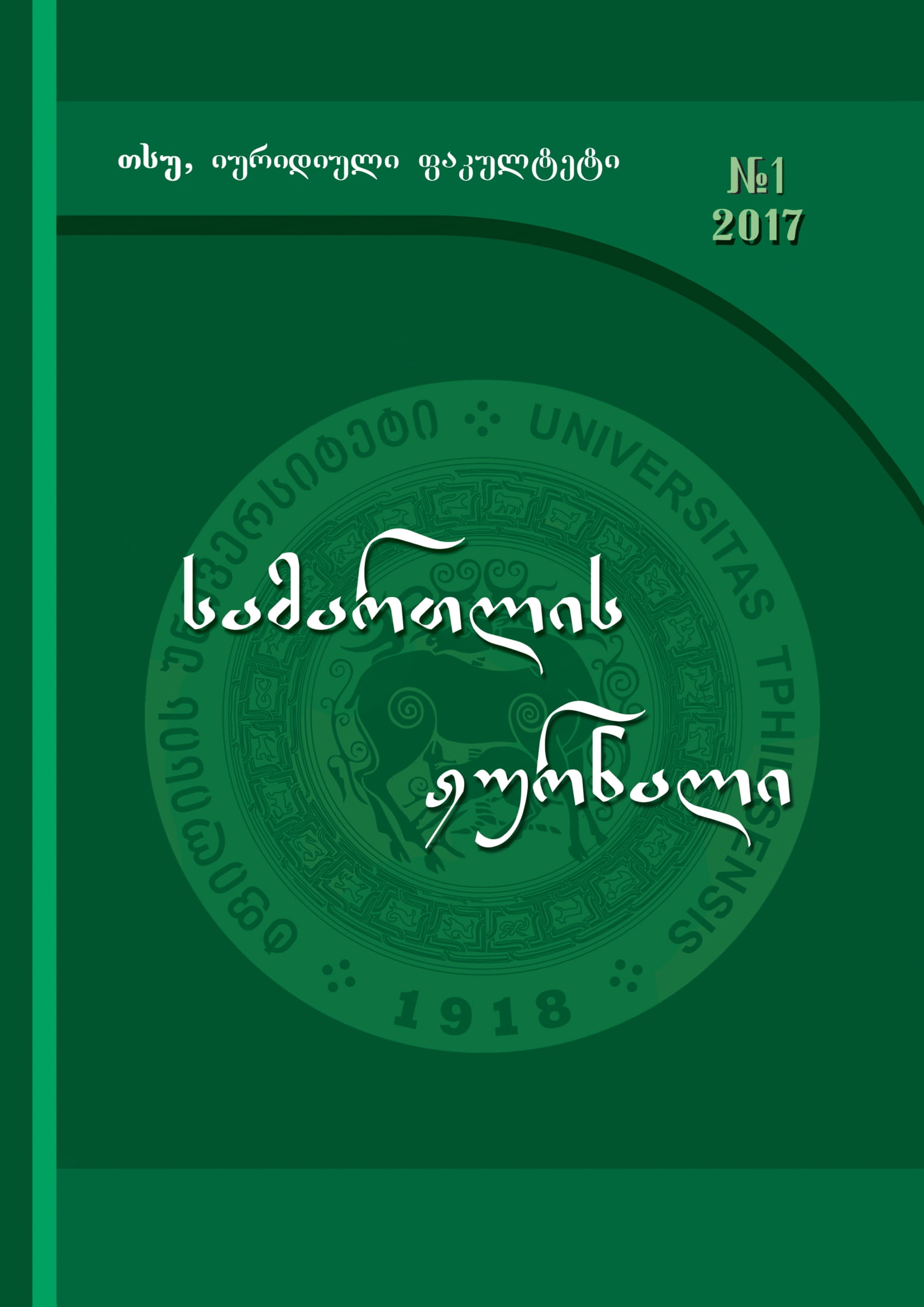დისკრიმინაციის აკრძალვის მნიშვნელობა სახელშეკრულებო თავისუფლებისათვის (ადამიანის ძირითად უფლებათა ჰორიზონტალური ეფექტის ჭრილში)
საკვანძო სიტყვები:
დისკრიმინაციის აკრძალვა, სახელშეკრულებო თავისუფლება, ადამიანის უფლებათა ჰორიზონტალური ეფექტი.ანოტაცია
წინამდებარე სტატია არის კიდევ ერთი მცდელობა ადამიანის ძირითადი უფლებებისა და კერძო სამართლის ურთიერთქმედების პრობლემის გაანალიზებისა. დისკრიმინაციის წინააღმდეგ მიმართული თანამედროვე კანონმდებლობა მნიშვნელოვნად ზღუდავს სახელშეკრულებო თავისუფლებას. ეს უკანასკნელი კი კერძო სამართლის საყრდენი და პიროვნების თავისუფალი განვითარების უფლების გამოხატულებაა. ამიტომ საინტერესოა, დავაკვირდეთ, თუ როგორ მოქმედებს “ანტიდისკრიმინაციული“ კანონმდებლობა სახელშეკრულებო სამართლის წიაღში და რა მოცულობით ზღუდავს იგი კერძო პირთა თავისუფლებას. თანასწორობის კონსტიტუციური პრინციპის ჰორიზონტალურ ურთიერთობებში, კერძოდ, სახელშეკრულებო თავისუფლებასთან მიმართებით გამოყენებისას, ვაწყდებით კერძო ინტერესთა კონფლიქტს, რომლის გადაჭრაც მოითხოვს ამ ორი ინსტიტუტის არსის ანალიზს თანამედროვე ღირებულებათა გათვალისწინებით.
სტატია მოიცავს როგორც დოქტრინულ საკითხებს, ისე ქართული კანონმდებლობის ანალიზსა და ევროკავშირის გამოცდილების მიმოხილვას.
კვლევის მიზანია, წარმოაჩინოს დისკრიმინაციის აკრძალვისა და სახელშეკრულებო თავისუფლების თანაარსებობასთან დაკავშირებული მნიშვნელოვანი პრობლემები და შესთავაზოს მკითხველს მათი გადაჭრის გზები.
წყაროები
Constitution of Georgia, 24/08/1995.
Civil Code of Georgia, 26/06/1997.
The Law of Georgia “about Elimination of all forms of discrimination”, 07.05.2014.
The Organic Law of Georgia “about Constitutional Court of Georgia”, 31.01.1996.
Council Directive 2000/43/EC of 29 June 2000 implementing the principle of equal treatment between persons irrespective of racial or ethnic origin , Official Journal L 180 , 19/07/2000 P. 0022 – 0026.
Council Directive 2000/78/EC of 27 November 2000 establishing a general framework for equal treatment in employment and occupation, Official Journal L 303 , 02/12/2000 P. 0016 – 0022.
Council Directive2004/113/EC of 13 December 2004 implementing the principle of equal treatment between men and women in the access to and supply of goods and services, Official Journal of the European Union, 21.12.2004 L 373/37.
Directive 2002/73/EC of the European Parliament and of the Council of 23 September 2002 amending Council Directive 76/207/EEC on the implementation of the principle of equal treatment for men and women as regards access to employment, vocational training and promotion, and working conditions, Official Journal L 269 , 05/10/2002 P. 0015 – 0020.
Basedow J., Freedom of Contract in the European Union, European Review of Private Law 6-2008, 902-903.
Chechelashvili Z., Contract Law (Comparative Law Inquiry Essentially on the Basis of Georgian Law), Tbilisi, 2014,17 (in Georgian).
Collins H., The Vanishing Freedom to Choose a Contractual Partner”, Law and Contemporary Problems, Vol. 76 (2), 2013, 71-75, 83-84.
Colm O’C., Taking Horizontal Effect Seriously: Private Law, Constitutional Rights and the European Convention on Human Rights, Hibernian Law Journal, Vol. 2003, 80-82.
Dzamashvili B., Discrimination as a Legal Category and Forms of its Expression, The protection of Human Rights and Judicial Reform in Georgia (ed. K. Korkelia), Tbilisi, 2014, 270-271, 275 (in Georgian),
Eremadze K., Balance of Interests in Democratic Society, 2013, 165-166, 169.
Greer S., “Balancing” and the European Court of Human Rights: A Contribution to the Habermas-Alexy Debate, The Cambridge Law Journal, Vol. 63, №2 (Jul., 2004), 413-419, 476-477.
Gutmann T., Theories of Contract and the Concept of Autonomy, Preprints and Working Papers of the Centre of Advanced Study in Bioethics, Münster, 2013/55, 8, 10.
Kay R.S., The European Convention on Human Rights and the Control of Private Law, European Human Rights Law Review, Issue 5, 2005, 476.
Koch J.,Münchener Kommentar zum BGB, 5 Aufl. 2010, 196.
Lobinger, T: Vertragsfreiheit und Diskriminierungsverbote. Privatautonomie im modernen Zivil - und Arbeitsrecht, Vertragsfreiheit und Diskriminierung, 2007, 102-105, 107, 115–117, 120-125, 127-128, 129-133, 135, 147-150, 141–146, 152-157, 159-160, 162-167.
Mak Ch., Fundamental Rights in European Contract Law, Amsterdam, 2007, 32-33, 50.
Park K., Die Drittwirkung von Grundrechte des Grundgesetzes im Vergleich zum koreanischen Verfassungsrecht, Diss., Halle (Saale), 2004, 14-19, 37-39.
Repgen T., Antidiskriminierung – die Totenglocke des Privatrechts läutet”, Vertragsfreiheit und Diskriminierung, 2007, 20, 22, 36-37, 40-42, 77-78, 91-92, 80-81, 88, 91-92, 105-108.
Rühl G., Consumer Protection in Choice of Law, Cornell International Law Journal, Vol.44, Issue 3, 2011, 571-572.
Seifert A., Die Horizontale Wirkung von Grundrechte Europarechtliche und rechtsvergeichende Überlegung, EuZW 2011, 699.
Somers S., Protecting human rights in horizontal relationships by tort law or elaborating tort law from a human rights perspective”, European Human Rights Law Review, Vol.2015,149-150
Tughushi T., Burjanadze G., Mshvenieradze G., Gociridze G., Menabde V., Human Rights and Case Law of Constitutional Court of Georgia, Tbilisi, 2013, 30-31, 35-37, 40-41 (in Georgian).
Dzlierishvili Z., Tsertsvadze G., Robakidze I., Svanadze G., Tsertsvadze L., Janashia L., Contract Law, Tbilisi, 2014, 50-51, 55 (in Georgian).
Zoidze B., Constitutional Control and Value Order in Georgia, Tbilisi, 2007, 17-18.
Wolf M., Rechtsgeschäftliche Entscheidungsfreiheit und vertraglicher Interessenausgleich, Tübingen 1970, 12-13, 19-22.
Wilhelmsson T., Contracts and Equality, Legal Theory, Stockholm, 2000, 146-147, 150-151, 155, 159, 161.
AZ: OLG Köln 24 U 51/09.
Das Urteil des Amtsgerichts Hannover vom 14.08.2013 (Az.: 462 C 10744/12).
Bull and Bull v Hall and Preddy, UK Supreme Court, B2/2011/0313 and B2/2011/0314 27.11.2013.
Constitutional Court of Georgia, Decision of 27th December 2010, №1/1/493, Political Unions “Akhali Memarjveneebi” and “Conservative Party of Georgia” against the Parliament of Georgia.
Constitutional Court of Georgia, Decision of 18th March 2011, №2/1/473, Citizen of Georgia Bichiko Chonkadze and others against the Minister of Energy of Georgia.
Constitutional Court of Georgia, Decision of 31th March, №2/1-392, Citizen Shota Beridze and others against Parliament of Georgia.
ჩამოტვირთვები
გამოქვეყნებული
როგორ უნდა ციტირება
გამოცემა
სექცია
ლიცენზია
საავტორო უფლებები (c) 2023 Salome Kerashvili

ეს ნამუშევარი ლიცენზირებულია Creative Commons Attribution-ShareAlike 4.0 საერთაშორისო ლიცენზიით .









